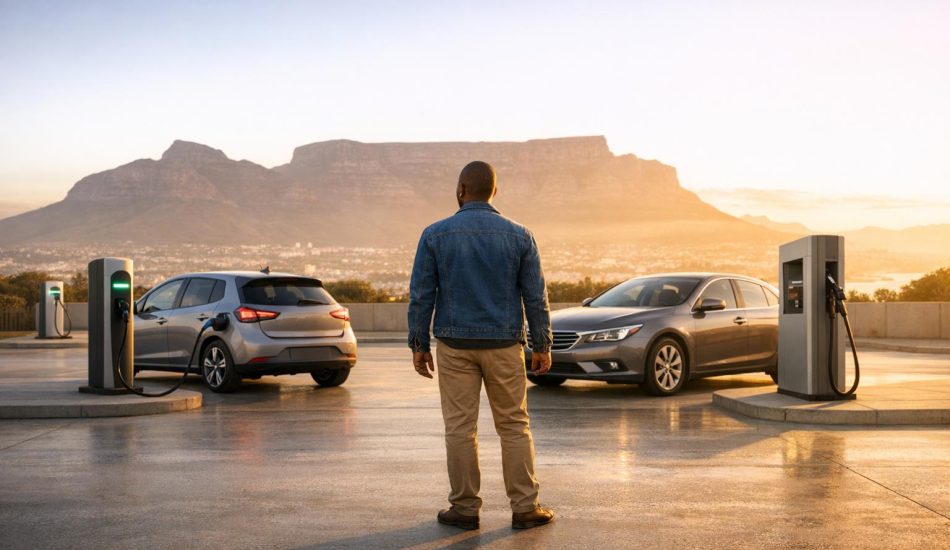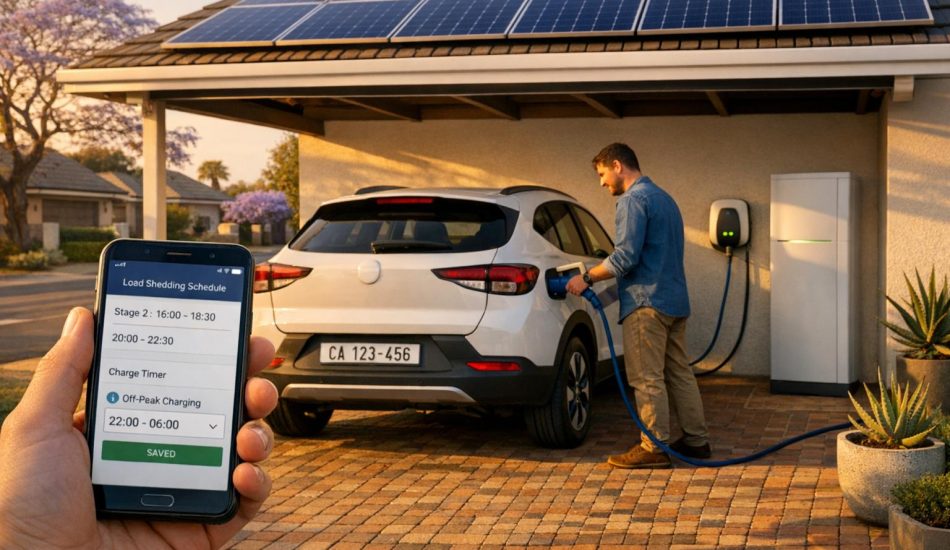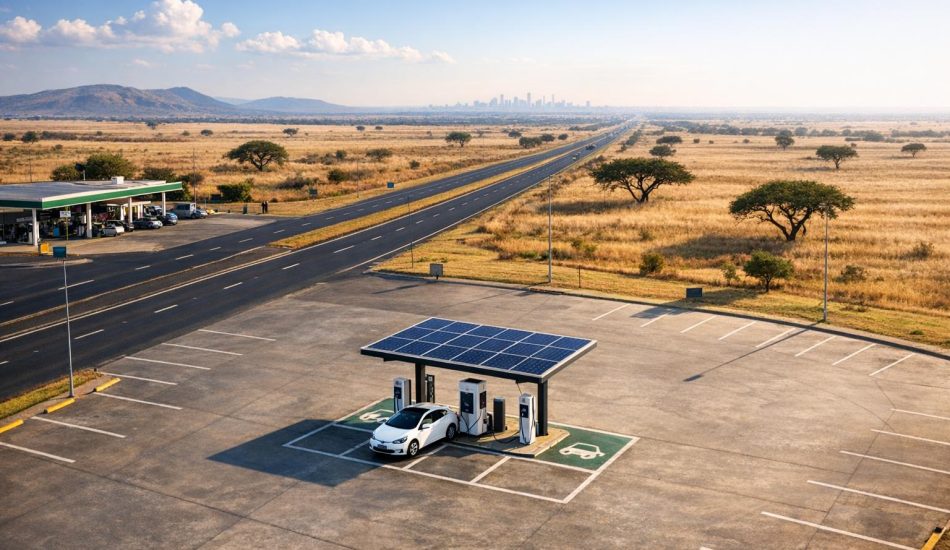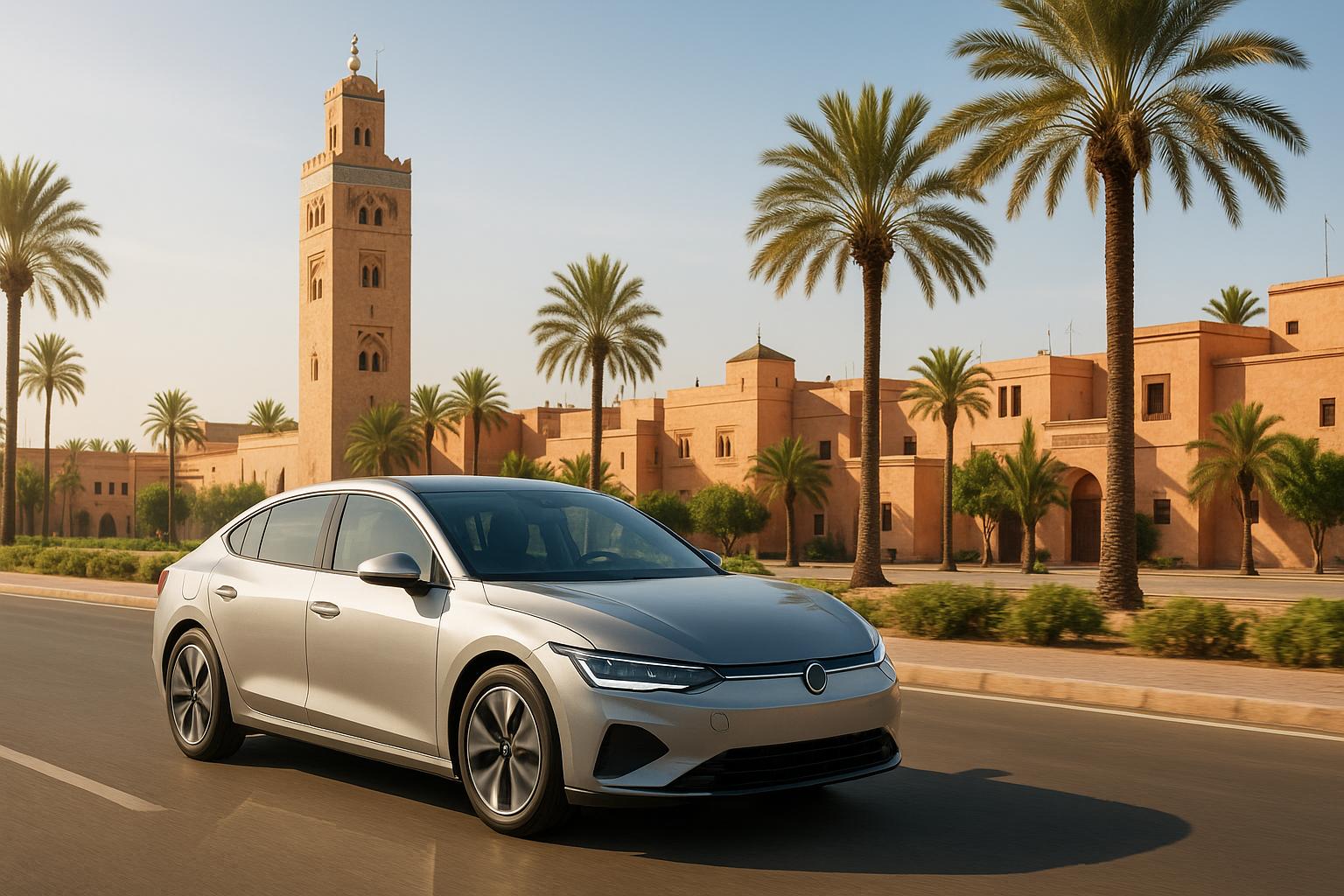
Morocco‘s 2025 electric vehicle (EV) import rules make it cheaper and easier to bring EVs into the country. Here’s what you need to know:
- Lower Taxes for EVs: Import duties and VAT are eliminated for qualifying EVs, saving thousands of dollars compared to gas cars.
- Eligibility Requirements: EVs must be fully electric (no hybrids), meet safety and technical standards, and have certifications for battery and charging compatibility.
- Simplified Process: Morocco’s new electronic customs system speeds up paperwork and tracking.
- Age Limits: EVs can be up to 10 years old (if battery health is certified), while gas cars must be under 5 years old.
- Savings Example: Importing a $30,000 EV costs about $835 in taxes, compared to $13,755 for a similar gas car.
These updates reflect Morocco’s push toward clean energy and make EV ownership more affordable for individuals, businesses, and returning residents.
What Changed in Morocco‘s 2025 EV Import Rules
Morocco is shaking things up with its 2025 electric vehicle (EV) import regulations, aiming to reshape its clean transportation strategy. These new rules prioritize EVs while modernizing the import process to align with the country’s renewable energy goals.
"The most dramatic 2025 regulatory change involves expanded electric vehicle incentives designed to accelerate EV adoption and support Morocco’s renewable energy objectives." – West Coast Shipping
In a bold move, Morocco has flipped the cost structure for vehicle imports. Traditional cars now face steep taxes, while qualifying EVs benefit from significantly reduced fees. Here’s a closer look at the major updates, including new priorities, stricter environmental standards, and updated documentation requirements.
Priority for Fully Electric Vehicles
The new regulations place fully electric vehicles front and center. To take full advantage of the incentives, your EV must run entirely on electric power – hybrids are excluded from the top-tier benefits. Additionally, the vehicle must meet specific requirements, such as a minimum battery capacity, to qualify. Importers should also ensure their EV’s charging system is compatible with Morocco’s growing charging infrastructure. On top of that, certifications from the manufacturer for the propulsion system and battery safety are now mandatory. These steps ensure that only vehicles with strong electric performance qualify for the reduced taxes.
Vehicle Age and Environmental Standards
Morocco is sticking to its five-year age limit for permanent vehicle imports, but enforcement has tightened. This ensures that incoming EVs meet modern safety and environmental standards. Importers must provide environmental compliance documentation from recognized testing authorities and a Certificate of Conformity to prove the vehicle adheres to Moroccan safety and technical requirements. Unlike countries like the U.S. – which allows a 25-year exemption for classic cars – Morocco’s approach highlights its focus on newer, cleaner technologies.
Required Documents
The 2025 regulations also bring a more streamlined documentation process. Morocco’s new electronic customs system simplifies submissions and enables real-time tracking of shipments. While the core documents remain the same – such as the Certificate of Conformity, commercial invoices, and notarized translations for non-Arabic or non-French paperwork – new technical certifications are now required for EVs. These include details on battery specifications, charging compatibility, and environmental compliance from approved agencies.
"Morocco’s vehicle import tax structure underwent significant changes in 2025, creating new opportunities for certain vehicle types while maintaining traditional tariffs for most passenger cars." – Dan Burkandt, West Coast Shipping
The electronic tracking system also makes it easier to monitor shipments, reducing delays caused by missing or misplaced paperwork. This improved process not only enhances transparency but also helps importers navigate the updated rules more efficiently.
How to Import Electric Vehicles in Morocco: Step-by-Step Process
Bringing an electric vehicle (EV) into Morocco involves careful planning and preparation. While the country’s electronic customs system has simplified some steps, ensuring all necessary documentation is in order is crucial to avoid delays or unexpected costs.
Preparing Your EV for Import
First, confirm that your EV qualifies for Morocco’s incentives and meets the required technical standards. Start by obtaining a Proforma Invoice (PI) from your supplier and securing key product certifications, such as CE or ISO, to show compliance with international standards.
You’ll also need manufacturer-issued certifications that cover the EV’s electric propulsion system, battery specifications, charging compatibility, safety features, a Certificate of Conformity (CoC), and environmental compliance from recognized testing authorities.
Draft a clear sales contract that outlines specifications, costs, and delivery timelines. Before making any purchase or shipment commitments, verify your EV’s eligibility for tax benefits with Moroccan customs or consult experienced shipping agents. Once all documentation is ready, you can move forward with shipping and customs procedures.
Navigating the Shipping and Customs Process
To ship your EV, ensure you have the following essential documents: a commercial invoice, packing list, bill of lading, and certificate of origin. Morocco’s electronic customs system simplifies these steps, but you’ll also need to prepare additional personal and vehicle-related paperwork:
- Vehicle and Sales Documents: Original vehicle title (with a lien release letter, if applicable), bill of sale detailing the transaction and vehicle specs, and the vehicle’s registration certificate from the country of origin.
- Personal Identification: A valid passport (with certified translations into Arabic or French), proof of residence, and a copy of your driver’s license (an international permit is recommended for foreign nationals).
- Additional Import Requirements: Import authorization for commercial or high-value vehicles, technical compliance documents for emissions and safety, proof of third-party liability insurance, and a notarized power of attorney if an agent is handling customs clearance on your behalf.
For Moroccan residents returning from abroad and seeking special import benefits, gather comprehensive proof of foreign residence, such as employment contracts, utility bills, tax records, or consular registration documents. Check specific eligibility requirements with the Moroccan consulate or customs officials before proceeding.
Make sure to submit certified translations for any documents not in Arabic or French. Always keep both the originals and certified copies on hand to avoid clearance delays.
Registering and Licensing Your EV
Once your EV clears customs, the next step is registration. Customs clearance documents serve as proof of legal entry and are required for this process.
Secure third-party liability insurance, complete homologation checks, and provide the necessary paperwork to the vehicle registration authority. These steps ensure your EV complies with Morocco’s safety and environmental standards.
Finally, companies like EV24.africa can assist in selecting EV models that are well-suited for Morocco’s infrastructure and simplify the import process. Missing or incorrect documents can lead to costly delays, so it’s best to start gathering all required authorizations well before shipping your vehicle.
Import Costs: Taxes, Duties, and Fees
If you’re considering importing an electric vehicle (EV) into Morocco in 2025, you’ll want to take a close look at the country’s updated EV incentives. These new regulations make EV imports much more affordable compared to traditional gasoline-powered vehicles, offering significant cost advantages.
Tax Breaks and Fee Reductions
Morocco’s 2025 EV incentives slash import costs for qualifying electric vehicles. For starters, customs duties on eligible EVs are completely eliminated, while conventional vehicles still face duties ranging from 10% to 17%. This alone can translate into thousands of dollars in savings.
On top of that, qualifying EVs can also be exempt from Morocco’s standard 20% VAT. This tax is typically calculated on the vehicle’s customs value plus any applicable import duties. By removing this VAT requirement for EVs, overall costs are reduced even further.
To qualify for these benefits, an EV must meet specific criteria, including full electric propulsion, a minimum battery capacity, environmental compliance documentation, and a Certificate of Conformity.
That said, some fees are unavoidable. Both EVs and conventional vehicles are subject to a Parafiscal Tax, which is approximately 0.25% of the vehicle’s taxable value. Additionally, administrative and processing fees, which generally range between $500 and $1,000, apply to all vehicle imports regardless of their fuel type.
By comparison, gasoline-powered cars face much higher import costs, as outlined below.
EV vs Gas Car Import Costs
The cost difference between importing an EV and a conventional gasoline car is striking. Let’s consider a $30,000 vehicle with $4,000 in shipping costs, giving it a total customs value of $34,000. Here’s how the numbers break down:
| Component | Conventional Gasoline Car | Qualifying EV |
|---|---|---|
| Customs Value | $34,000 | $34,000 |
| Import Duty | $5,100 (15%) | $0 |
| VAT | $7,820 (20% on value + duty) | $0 |
| Parafiscal Tax | $85 (0.25%) | $85 (0.25%) |
| Additional Fees | $750 | $750 |
| Total Tax Burden | $13,755 | $835 |
| Total Landing Cost | $47,755 | $34,835 |
As the table shows, importing a qualifying EV could save you nearly $13,000 compared to a similar gasoline vehicle. For a $25,000 EV meeting all criteria, the total tax burden might drop to just $200–$800, offering savings of $7,200–$12,950 compared to a conventional car of the same value.
These incentives align with Morocco’s broader goal of sourcing over 50% of its energy from renewable resources by 2030. By encouraging EV adoption, the country is taking steps to support its green energy initiatives.
Rules for Returning Moroccan Residents
Returning Moroccan residents may also benefit from additional import perks under certain conditions. In many cases, these residents can import one personal vehicle duty-free, provided they meet specific requirements. This includes proof of continuous foreign residence for at least two years, along with documentation showing their return to Morocco for permanent residency.
To qualify, residents must submit detailed paperwork, such as employment contracts from abroad, foreign tax records, utility bills, and consular registration documents. The vehicle must also be registered under their name in the country of origin and owned for a minimum period before import.
These benefits can be combined with Morocco’s EV incentives, potentially eliminating nearly all import costs for qualifying electric vehicles. However, the process involves strict documentation and timing requirements, so it’s essential to consult Moroccan customs authorities well in advance of shipping your vehicle.
sbb-itb-99e19e3
How to Stay Compliant and Pick the Right EV
Importing an electric vehicle (EV) into Morocco in 2025 requires careful adherence to regulations and thoughtful decision-making to maximize savings and avoid potential pitfalls.
Meeting All Requirements
First, ensure all your documentation is complete and up to date. This includes technical inspection reports (issued within the last six months) and a valid Certificate of Conformity (CoC), both of which are essential for customs clearance. Missing or outdated documents can lead to customs delays, hefty fines of up to 20,000 dirhams, or even rejection of your EV at the border.
Your EV must meet Morocco’s updated 2025 standards, which require vehicles to have a fully electric propulsion system and a minimum battery capacity. While conventional vehicles must be under five years old, EVs may qualify for an extended import window of up to 10 years, provided their battery health is certified. Battery health certifications and technical inspection reports must align with the latest requirements to ensure compliance.
Another critical factor is charging compatibility. Morocco’s charging infrastructure primarily supports Type 2 and CCS connectors, so confirm that your EV is compatible to avoid future inconvenience.
If navigating the customs process feels overwhelming, consider hiring a seasoned customs agent familiar with Morocco’s electronic customs system. Their expertise can help you sidestep common errors and streamline the import process.
Selecting Your Electric Vehicle
Choosing the right EV for Morocco involves balancing performance, range, and compatibility with local conditions. Look for an EV with a battery range of at least 200 miles (320 kilometers) to handle longer trips between cities, where charging stations might be sparse.
Popular models like the BYD Dolphin and Tesla Model 3 are solid choices due to their reliability and strong resale value in Morocco’s growing EV market. These vehicles are known for their durable batteries and widespread brand recognition, which can help maintain their value over time.
Fast-charging capabilities are another key feature to prioritize. Morocco’s charging network is still developing, and having rapid charging support can significantly reduce downtime during long drives.
Additionally, consider the availability of a manufacturer’s support network in Morocco or nearby regions. Vehicles with established service centers and accessible spare parts are typically easier and more affordable to maintain in the long run.
Battery warranties are also worth scrutinizing. Morocco’s 2025 regulations include stricter battery recycling requirements and may mandate periodic battery health certifications. Opting for an EV with a comprehensive battery warranty and a recycling program backed by the manufacturer can help you stay compliant and avoid unexpected costs.
Using EV24.africa for Your Import
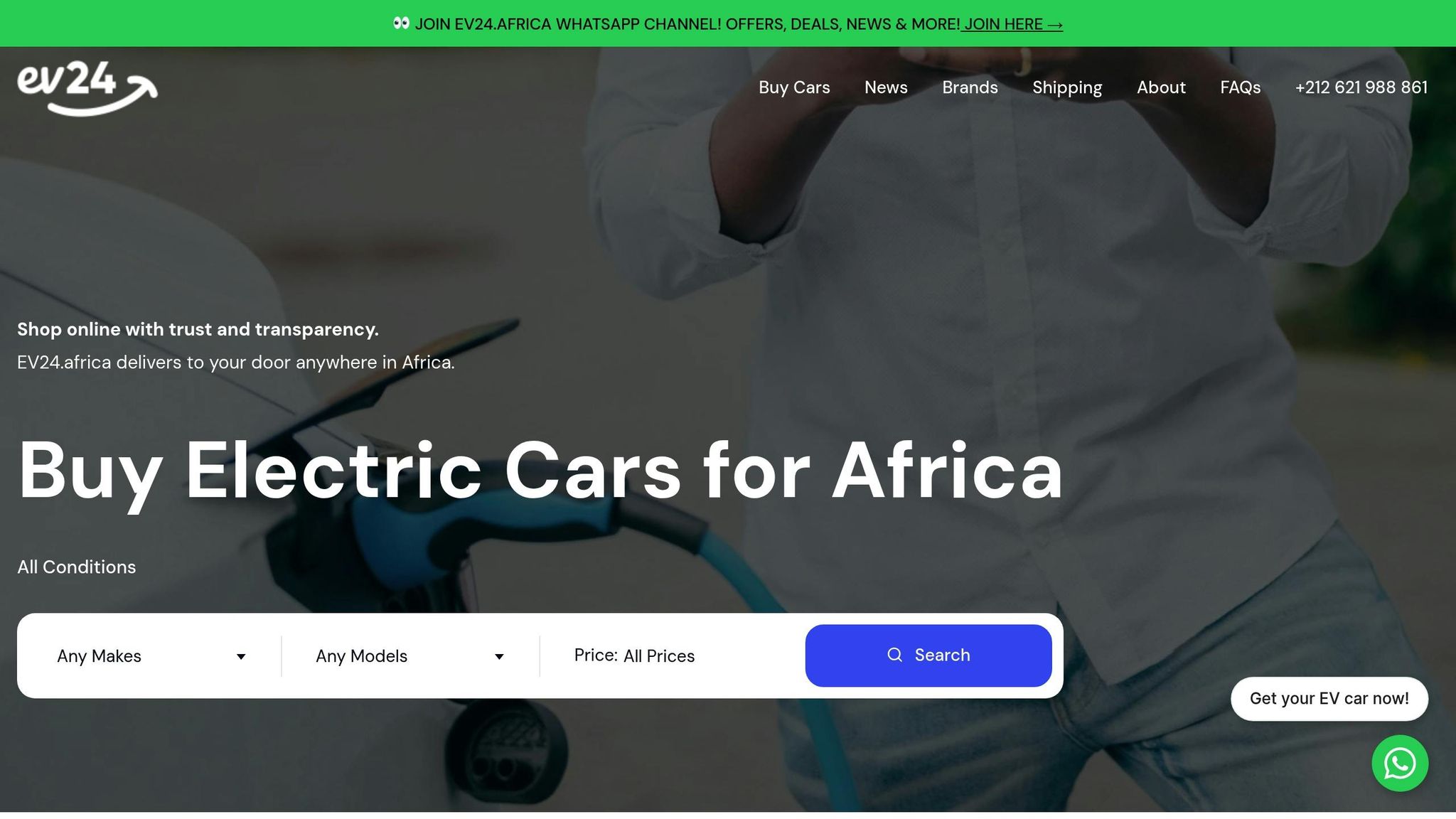
For a smoother import experience, EV24.africa offers comprehensive support tailored to Morocco’s regulations. Their services include assistance with documentation, transparent pricing, and expert navigation of the customs process, boasting a 95% clearance success rate.
The platform provides clear, upfront pricing that incorporates Morocco’s EV incentives, helping you accurately budget for your total landing costs. This transparency allows you to compare different EV options based on their true imported cost, making it easier to make an informed choice.
For Moroccan residents abroad (MREs), EV24.africa offers specialized documentation support to help you access additional import benefits. Their logistics services cover every stage of the process – from sourcing the vehicle to final registration – minimizing delays and ensuring compliance at every step.
With EV24.africa’s expertise, you can simplify the complexities of importing an EV while ensuring all technical and regulatory requirements are met efficiently.
Conclusion
Morocco’s 2025 electric vehicle import regulations open up exciting possibilities for both buyers and businesses. With fully electric vehicles now enjoying a 0% VAT rate and complete exemption from customs duties, the financial perks are hard to ignore.
The introduction of digital customs systems, streamlined paperwork, and extended age limits for imported vehicles makes the process more straightforward than ever. For returning residents, the added bonus of up to 90% tax reductions sweetens the deal even further. However, navigating these changes still requires thoughtful planning and accurate documentation.
Tesla‘s decision to establish a local subsidiary in June 2025, backed by a $2.8 million investment, highlights growing international trust in Morocco’s regulatory framework. This move signals a bright future for the country’s electric vehicle market.
On top of that, Morocco’s Green Transport Plan 2025 offers additional incentives, such as the 2,000 dirham (approximately $1,300) subsidy for electric two-wheelers, making cleaner mobility more accessible.
"At EV24.africa, we simplify the process of importing and buying electric vehicles in Africa. Our expertise ensures a seamless, transparent, and stress-free experience, so you can focus on driving the future of mobility."
With the right guidance and preparation, the path to a more sustainable future in Morocco is becoming easier to navigate.
FAQs
What technical and safety standards do electric vehicles need to meet for Morocco’s 2025 import incentives?
To benefit from Morocco’s 2025 electric vehicle import incentives, EVs must adhere to strict technical and safety criteria. These include being fully electric (not hybrids), possessing a Certificate of Conformity to verify alignment with both international and local regulations, and meeting a minimum battery capacity requirement to ensure reliable performance.
The goal of these standards is to encourage the use of efficient, high-quality electric vehicles while supporting the shift toward more eco-friendly transportation options.
How does Morocco’s new electronic customs system simplify importing electric vehicles?
Morocco has introduced an electronic customs system that simplifies the process of importing electric vehicles (EVs). By moving away from traditional paper-based methods, this digital platform allows importers to submit documents, track shipments, and handle customs declarations entirely online. The result? Fewer delays and less administrative hassle.
The system also improves transparency by offering real-time updates and reducing the likelihood of errors. This shift not only makes the process smoother for individuals and businesses but also aligns with Morocco’s efforts to promote a more sustainable and accessible EV market.
What steps should Moroccan residents returning in 2025 take to qualify for additional benefits when importing an electric vehicle?
Returning Moroccan residents planning to bring an electric vehicle (EV) into the country in 2025 should take a few key steps to ensure everything goes smoothly and to make the most of any available benefits.
First, confirm that your EV meets Morocco’s updated import regulations. This includes checking for compliance with emissions standards and any technical requirements. Next, gather all the required paperwork. This typically includes proof of your residency abroad, the vehicle purchase invoice, and any necessary customs forms. Additionally, find out if your EV qualifies for tax breaks or reduced import duties under the latest rules.
Staying informed about deadlines or procedural updates from Moroccan authorities is equally crucial. To avoid unnecessary complications or expenses, consider reaching out to a customs expert or the relevant government offices for guidance.


